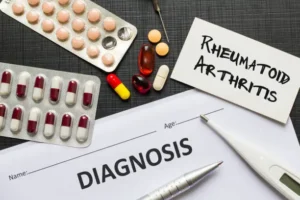Living with rheumatoid arthritis (RA) is like having your immune system wage war on your joints 24/7. It’s painful, exhausting, and disabling. That’s where medications come in—they’re lifesavers. However, like many potent therapies, they often carry a hidden cost that can affect more than just the body.” One of the most unnerving and lesser-known side effects? Psychosis.
Yes, that’s right. Some medications used to treat RA can affect not just your body, but also your mind.
Let’s dive deep into how RA medications may trigger psychosis, who’s most at risk, and what you can do if it happens to you or someone you love.
Understanding Rheumatoid Arthritis
Causes and Risk Factors
RA is an autoimmune disease. In simple terms, your immune system turns against you, targeting your tissues, mainly the joints, as if they were the enemy. It’s not clear what causes this, but genetics, hormones, and environmental triggers like smoking may all play a role.
Symptoms and Diagnosis
RA often starts with:
Morning stiffness
Swollen, tender joints
Fatigue
Low-grade fever
Doctors use blood tests (like rheumatoid factor and anti-CCP), X-rays, and clinical exams to diagnose it.
Common Treatment Approaches
The goal? Their goal is to calm inflammation, ease discomfort, and protect your joints from long-term harm. This usually involves a combo of medications and lifestyle changes.
Common Medications Used in RA
Mansards (Disease-Modifying Medication Drugs)
These slow the progression of RA. Merthiolate is the most commonly prescribed DMARD.
Biologic Agents
These treatments are more specialized and usually come into play when DMARDs aren’t doing the job effectively.. Examples include etanercept, mwalimu, and infliximab.
Corticosteroids
Like prednisone, these offer quick relief but come with heavy side effects if used long-term.
NSAIDs
Drugs like ibuprofen and naproxen help manage pain and inflammation, but don’t prevent disease progression.
Medication Side Effects Overview
RA medications can feel like a double-edged sword—offering relief, but sometimes bringing unexpected side effects. Side effects range from mild to life-altering.
Physical Side Effects
Nausea
Weight gain
High blood pressure
Liver issues
Mental and Emotional Effects
Mood swings
Depression
Anxiety
In rare cases, psychosis
Rare but Serious Complications
Organ damage
Severe infections
Mental health disorders

What Is Psychosis?
Definition and Symptoms
Psychosis is a serious mental state in which a person struggles to distinguish between what’s real and what’s not.. They may experience:
Hallucinations (seeing or hearing things that aren’t there)
Delusions (false beliefs)
Disorganized thinking or speech
Extreme emotional swings
Causes Unrelated to RA
Psychosis can be caused by:
Schizophrenia
Bipolar disorder
Severe depression
Substance abuse
But what about medications? Yep—they can trigger it too.
Can RA Medications Cause Psychosis?
Corticosteroids and Psychiatric Side Effects
This is the big one. Steroid-induced psychosis is well documented. High doses of prednisone or similar drugs can cause:
Mania
Paranoia
Hallucinations
These effects can appear within days to weeks of starting the medication.
Methotrexate and Mental Health Concerns
Though rare, methotrexate has been linked to neurological changes, including:
Confusion
Mood shifts
Rare psychotic reactions
Biologics and Rare Neuropsychiatric Effects
Biologics like adalimumab and infliximab have had occasional reports of:
Depression
Suicidal ideation
Cognitive dysfunction
Psychosis (extremely rare)
Patient Case Reports and Clinical Findings
Medical literature includes real patient cases where individuals developed psychosis after starting RA meds, especially corticosteroids.
Risk Factors for Developing Psychosis from RA Meds
Pre-existing Mental Health Issues
If you already have depression, bipolar disorder, or anxiety, you’re more susceptible.
Age and Gender
Elderly patients may have a higher risk due to sensitivity to medications.
Dosage and Duration of Medication
Higher doses and long-term use, particularly of steroids, increase risk dramatically.
Polypharmacy and Drug Interactions
Mixing multiple medications raises the chance of unpredictable side effects.
Recognizing Early Signs of Psychosis
Behavioral Changes
Social withdrawal
Extreme agitation
Paranoia
Hallucinations and Delusions
Hearing voices
Believing in conspiracies or false realities
Emotional Instability
Rapid mood swings
Unprovoked anger or euphoria

How Doctors Monitor Mental Health During RA Treatment
Screening Before Prescribing
Doctors often ask about your mental health history before starting certain drugs.
Regular Check-Ups and Mental Health Assessments
Frequent follow-ups help catch warning signs early.
What to Do If You Suspect Medication-Induced Psychosis
Talk to Your Doctor Immediately
Don’t wait. Early intervention is key.
Never Stop Medication Abruptly
Suddenly stopping some drugs, like steroids, can be dangerous.
Possible Adjustments and Alternatives
Your doctor may:
Lower the dose
Switch medications
Refer you to a psychiatrist
Coping Strategies for Patients and Caregivers
Educating Yourself and Your Support System
Knowledge is power. Everyone involved should know what signs to watch for. Rheumatoid arthritis
Psychological Counseling and Therapy
Cognitive-behavioral therapy can help you process and manage symptoms.
Managing Stress and Lifestyle Habits
Exercise, sleep, mindfulness, and a healthy diet all play a crucial role in maintaining mental wellness.
Long-Term Outlook and Recovery
Can You Fully Recover?
In many cases, yes. Once the medication is adjusted or stopped, psychosis often fades.
Adjusting Treatment Moving Forward
A revised medication plan can prevent future episodes.
Preventing Recurrence
Stay in close contact with your healthcare team and report any changes quickly.
When to Seek Emergency Help
Danger to Self or Others
If someone is talking about hurting themselves or others, call emergency services immediately.
Sudden Severe Symptoms
Acute hallucinations or delusions? Don’t hesitate—get help now.
Facts: RA Meds and Mental Health
Separating Fear from Facts
Not everyone will experience psychosis. It’s rare, but real.
Clarifying Common Misconceptions
Myth: “Steroids always cause psychosis.”
Fact: Only a small percentage of people experience this.
Psychosis means you’re crazy.”
It’s a medical condition, not a character flaw.
Conclusion
RA medications are powerful tools—but they’re not without their shadows. Psychosis is a rare but serious side effect that deserves awareness, not fear. The key is open communication, regular monitoring, and taking action at the first sign of trouble. If you or a loved one is walking this difficult path, know that help is available, and recovery is possible. Rheumatoid arthritis.
FAQs
- Can methotrexate cause psychosis?
It’s rare, but there are reports of methotrexate leading to mental confusion or even psychosis, especially when combined with other drugs. - How common is steroid-induced psychosis?
Around 5% of patients on high-dose steroids experience some form of psychosis or mood disorder. Rheumatoid arthritis. - What are the warning signs of psychosis from RA meds?
Look out for paranoia, hallucinations, mood swings, and changes in behavior or speech. - Are biologics safer for mental health?
Generally, yes—but they still carry a small risk of neurological side effects. - Can psychosis go away after stopping RA medication?
Yes. Many people recover fully once the medication is stopped or adjusted under medical supervision.

